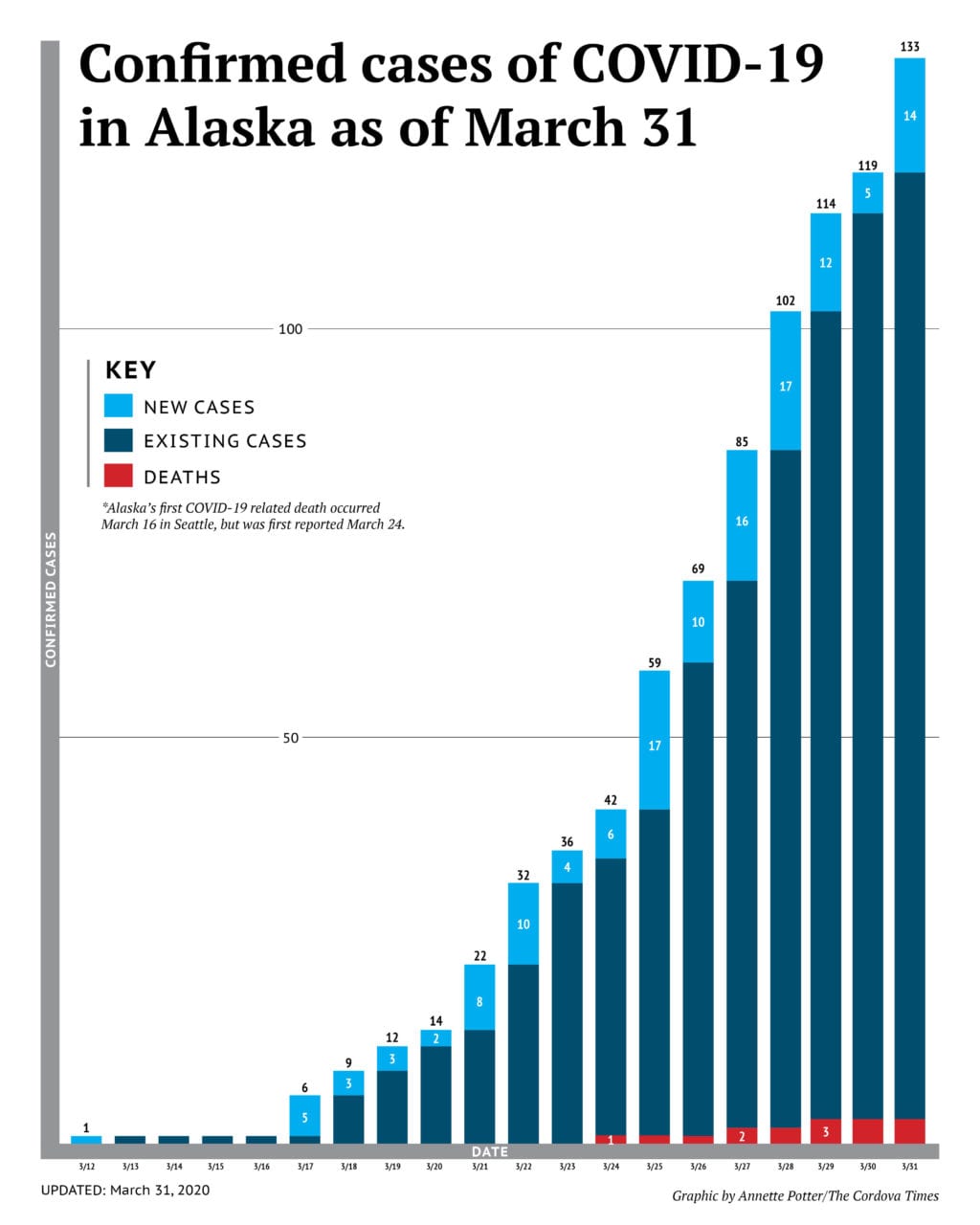Numbers of people who have tested positive for the novel coronavirus in Alaska keep on slowly rising as state officials employ new mandates to slow the spread while building up health care resources to treat more anticipated patients.
On Tuesday, March 31, the addition of 14 more people testing positive for COVID-19 pushed the statewide total to 133 people out of more than 4,600 who have been tested in Alaska.
The newly confirmed cases included Fairbanks 5, Juneau 4, Anchorage 2, Eagle River 2, and Kenai 1.
Dr. Anne Zink, the state’s chief medical officer, said two of the patients were adults aged 60 or more, 10 were in the 30-59 age group and two were in the 19-29 ranks. Five of those diagnosed had close contact with previously diagnosed people, two were travel-related and seven were under investigation.

Also on the list, was an Alaskan who tested positive on the North Slope after returning from travel outside of the state. State officials said the patient had returned to Alaska two days prior to the release of a health mandate requiring everyone entering the state to self-quarantine for 14 days. The patient had traveled to the North Slope on March 25 and displayed symptoms within two days of arriving.
He was then tested and put in quarantine, as were his immediately identified close contacts.
The state’s Emergency Operations Center has been working with operators of the North Slope oil fields and contractor companies to have robust travel plans and mitigation strategies in place, a strategy also in place with other industries in the state to contain the spread of the virus.
Three residents who contracted the virus have died and nine others are hospitalized.
State officials continue to urge everyone to wash their hands frequently, keep a six-foot distance from others and to wipe down frequently touched surfaces often, all in the effort to limit the number of Alaskans infected by the pandemic.
The goal, said Zink, is to keep the upward curve of infections “pushed as low as it could go.”
Alaska numbers to date are “not yet on an acceleration phase like New York is having and we really need to keep it there,” she said.
In addition to health concerns, “we also realize an economic disaster is unfolding,” said Gov. Mike Dunleavy, noting that mandates imposed to limit the spread of the virus were adversely impacting the ability to do business.
State officials are working to do everything they can to stabilize the economy, he said.
To that end, new steps were announced to advance the state’s COVID-19 economic stabilization plan. These include suspension of certain fees and fines within the state Departments of Health and Social Services, Administration, Commerce, Labor and Revenue through May 11. The governor said the disaster order of suspension would help individual Alaskans and the business community get through the economic impact of the virus.
The Legislature, now in recess, on March 29 passed the state’s capital and operating budgets, providing critical funding to allow the state to respond to the COVID-19 crisis, and ensure that essential services will continue operating uninterrupted in the upcoming fiscal year.
The package includes funding for $1,000 Permanent Fund Dividend checks.
“Alaskans take care of Alaskans,” said House Speaker Bryce Edgmon, I-Dillingham. “That’s never been truer than during the COVID-19 crisis, and we saw another example today as we set aside our differences and worked together as a unified Legislature to pass a budget in record time and ensure that essential services will continue without interruption.”
House Bill 205 included several items related to COVID-19 response efforts, including: $75 million for the Department of Health and Social Services, $5 million for the Disaster Relief Fund, $5 million for the Alaska Housing Finance Corporation, and $2.7 million for the public health services provided by the Municipality of Anchorage.
HB 205 approves spending $4.54 billion of unrestricted general fund, including $14 million for the Village Public Safety Officer program, $151 million for Alaska State Troopers, $98 million for Pioneer Homes and $21 million for senior benefits “to make sure the elders who build the state live with dignity,” House leaders said in a statement on benefits of the approved legislation.





